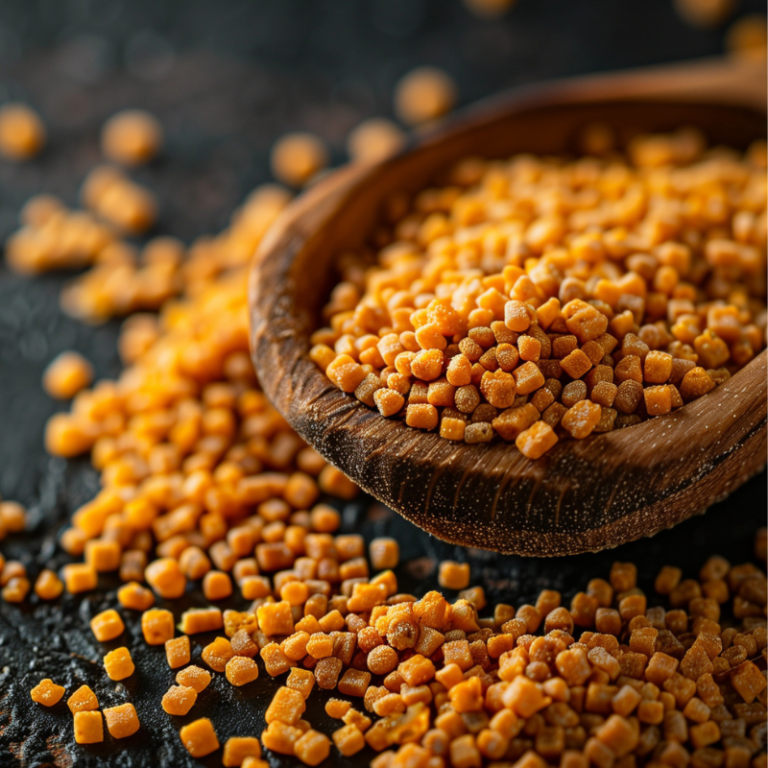Introduction to Bee Pollen
Bee pollen has gained popularity in recent years as a nutrient-dense superfood celebrated for its numerous health benefits. Collected by bees from flowers, bee pollen contains a unique blend of proteins, vitamins, and antioxidants. With a long history of use in traditional medicine, bee pollen is praised for its potential to enhance immune function, support digestive health, and improve energy levels. Let’s dive into everything you need to know about this incredible natural supplement.
Nutritional Composition of Bee Pollen
One of the reasons bee pollen stands out is due to its exceptional nutritional profile. Rich in essential nutrients, bee pollen contains:
- Proteins and Amino Acids: Building blocks for muscle repair and overall body function.
- Vitamins: Including B-complex vitamins, vitamin C, and vitamin E, which contribute to immune health.
- Minerals: Such as magnesium, calcium, and potassium, which support bone health and energy production.
- Antioxidants: Help fight oxidative stress, which can reduce inflammation and protect cells.
For a more in-depth understanding of similar superfoods, you might find the nutritional and health benefits of sunflower seeds particularly interesting.
Health Benefits of Bee Pollen
The variety of bee pollen benefits covers many aspects of health. Whether you’re seeking immune support or a natural energy boost, bee pollen offers numerous advantages.
Boosts Immunity
Bee pollen’s unique combination of vitamins, minerals, and antioxidants is ideal for boosting immunity. Nutrients like vitamin C and flavonoids strengthen the body’s defenses, helping it fight infections and ward off illness.
Anti-Inflammatory Properties
Bee pollen possesses powerful anti-inflammatory properties that can benefit those dealing with chronic inflammation. According to Dr. Axe’s insights on bee pollen, the presence of compounds like quercetin and antioxidants help reduce inflammation, making it suitable for those with arthritis or joint pain.
Supports Digestive Health
With enzymes that aid in digestion, bee pollen promotes a healthy gut microbiome. Improved gut health can enhance nutrient absorption, contributing to overall wellness. Bee pollen also acts as a prebiotic, feeding the good bacteria in your gut.
Energy and Vitality
Known as a natural energy booster, bee pollen is often used by athletes and those with active lifestyles to enhance endurance and combat fatigue. Its blend of proteins, carbs, and B-vitamins provides a sustainable energy source throughout the day.
Skin Health
Topical applications of bee pollen can improve skin hydration, reduce inflammation, and support wound healing. For those looking to add natural elements to their skincare routine, bee pollen’s antioxidants make it a great option.
Potential Risks and Side Effects of Bee Pollen
While bee pollen is generally safe, it’s essential to understand potential side effects:
- Allergic Reactions: People allergic to pollen or bee products should avoid bee pollen, as it can trigger reactions.
- Interactions with Medications: Bee pollen may interact with certain medications, so consult a healthcare provider if you’re on medication.
- Recommended Dosage: Begin with a small amount to test for any adverse reactions, especially if you’re new to bee pollen.
Bee Pollen in Traditional Medicine and Cultural Use
Historically, bee pollen has been revered in various cultures and medicine systems. In traditional Chinese medicine, bee pollen is valued for its ability to replenish energy and restore balance in the body. Ayurvedic practitioners also consider it a rejuvenating tonic for longevity.
Types of Bee Pollen and How They Differ
The nutritional profile of bee pollen can vary based on the flowers from which it is collected. Here are some common types:
- Wildflower Pollen: Collected from a variety of wildflowers, this type is rich in diverse nutrients.
- Buckwheat Pollen: Known for its darker color and higher antioxidant content.
- Clover Pollen: Mild and often used in natural health products for its balanced nutrient profile.
How to Use Bee Pollen in Your Daily Routine
Integrating bee pollen into your diet is simple and versatile. Here are some ideas:
- Add a spoonful to smoothies, yogurt, or oatmeal.
- Sprinkle it over salads for a nutrient boost.
- Incorporate into homemade energy bars.
Recommended Dosage
Begin with a small dose, such as 1/4 teaspoon, and gradually increase to 1-2 tablespoons daily. This allows your body to adjust to the new supplement.
Buying and Storing Bee Pollen
To get the most from bee pollen, choose high-quality products. Look for fresh or organic bee pollen from reputable sources. When storing, keep bee pollen in a cool, dry place, or refrigerate it to preserve its freshness and nutrients.
Sustainability and Ethical Concerns Around Bee Pollen Harvesting
Bee pollen harvesting can impact bee populations, so it’s crucial to buy from brands that prioritize sustainable practices. Ethical harvesting ensures that bees are not harmed and that their natural ecosystem is maintained.
Scientific Studies on Bee Pollen
Ongoing research continues to explore the therapeutic potential of bee pollen in immune support, inflammation reduction, and antioxidant activity. Studies highlight its promise in natural health applications, adding to its long history of use.
Frequently Asked Questions (FAQs)
- What are the main health benefits of bee pollen?
Bee pollen boosts immunity, supports digestion, and reduces inflammation. - Can bee pollen help with allergies?
While some people find relief, those with pollen allergies should avoid it. - What’s the recommended dosage for bee pollen?
Start with 1/4 teaspoon and gradually increase to 1-2 tablespoons daily. - Are there any side effects of taking bee pollen?
Allergic reactions are possible, especially for those with pollen allergies. - How is bee pollen different from honey?
Bee pollen is collected from flowers and contains proteins, vitamins, and minerals, whereas honey is a natural sugar.
Conclusion
Bee pollen is a nutrient-rich superfood with a variety of health benefits. From boosting immune health to supporting skin and digestive health, bee pollen is a valuable addition to a wellness routine. However, remember to purchase sustainably harvested bee pollen and start with small amounts to avoid potential allergies. With proper use, bee pollen can be a fantastic natural supplement for enhancing overall health and vitality.
